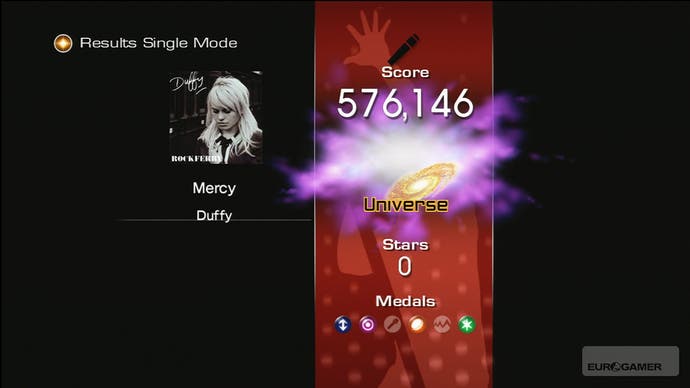Lips
All singing, some dancing.
If music be the food of love, then karaoke is... What, exactly? A cheap, vaguely guilty but widely enjoyed pleasure - the kebab of romance? The battered sausage of passion?
We do mean "widely enjoyed", too. Karaoke has been rehabilitated. Once a word on a chalkboard outside your local which might as well have said "Go Away", karaoke is now a staple of parties, nights out and nights in alike. Very British inhibitions have given way to our inner songbirds, and we've suddenly decided that watching our pals murder the classics is actually great entertainment, rather than being embarrassment on a similar scale to walking in on your parents in flagrante delicto.
Two major things deserve credit for this renaissance in the warbling arts. Firstly, there's the sudden proliferation of Japanese-style karaoke booth establishments, where you book a private, waiter-served room with a handful of your friends - rather than stumbling drunkenly on-stage in front of a bar full of strangers to belt out Independent Woman three octaves too high for your voice. Secondly, and arguably more influentially, there's SingStar.
Whoops, there we go - three paragraphs into a preview of Microsoft's Xbox 360 karaoke title, and we've already mentioned the elephant on the table. SingStar is a big deal, though. It's sold millions of copies, and while the technology behind the game has evolved disappointingly slowly since its inception, there are tons of discs of songs available for the PS2 version - and hundreds of tracks online for the PS3 edition.
That's a big hurdle for Lips to jump over, because frankly - let's get this out of the way early on - any karaoke game lives or dies on the strength of its track listing and available content. You could build the most technologically impressive singing game ever, but 99 per cent of people's purchase decision would still be based on what they get to sing, at the end of the day.

To make matters worse, everyone's tastes are going to differ wildly on that front. There are people in this world who think it's acceptable to sing Celine Dion ballads in public, for god's sake - but if you want to make a karaoke game that'll be a success, you need to appeal to those deviants as well as those who just want to growl along to some throat-shredding rock classics.
Looking at Lips' original line-up of 40 tracks, there's a solid attempt at variety on display here. It's likely that almost everyone will find something they can sing. It's also likely that most people will only find two or three things they actually want to sing. The result is that Lips' success depends almost entirely on the quality and quantity of downloadable songs which appear after release. If they can get a couple of dozen songs out every Friday, with good variety and reasonable prices, and rapidly build up to (or surpass) SingStar's library, Lips will be a winning product. If not, they might as well not have bothered at all.
With that sobering note out of the way, though, there's actually a surprising amount to say about the other 1 per cent of Lips' potential success - the game itself, and the technology therein.

While it's easy to roll your eyes and accuse Lips of hopping on the bandwagon of SingStar's success - it's easy because it's entirely true, of course - Microsoft cannot be accused of creating a direct clone in this instance. In fact, after an evening with Lips at the publisher's rather oddly arranged "house party" (most of our house parties don't take place in grand ballrooms with waiters serving around trays of sushi, canapes and champagne while legendary pop stars sing their hits on stage - perhaps we're just doing it wrong), we came away pleasantly surprised at just how advanced the game is compared with Sony's karaoke queen.
Lips, in many ways, is the game we've wanted Sony to develop SingStar into. Going hands-on (er, lips-on?) revealed that almost everything on our SingStar Wishlist has been included in Lips - it's almost as if the developers had looked around the internet to see what SingStar players really, really wanted from the game, and built all of those features into their own version. In fact, that's probably exactly what happened.
Starting with the obvious - wireless microphones. We're sure we remember these being promised for SingStar PS3, way back when, but they've certainly never emerged. Lips' wireless mics feel fairly sturdy and, as you've probably seen, have a set of flashing, glowing LEDs in the bottom section of the microphone. Hurrah for LEDs.


